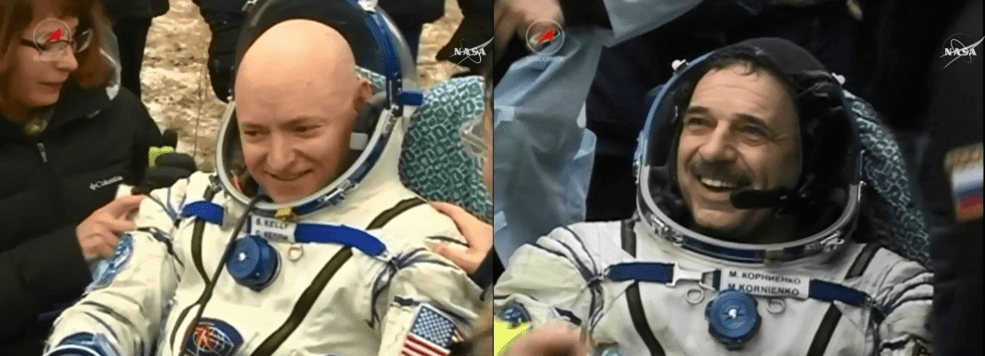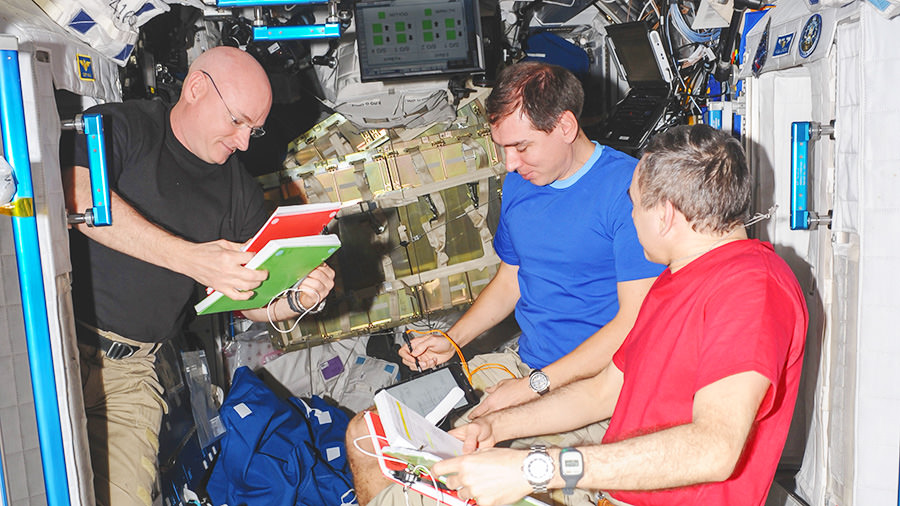
KENNEDY SPACE CENTER, FL – NASA Astronaut Scott Kelly and his Russian cohort Mikhail Kornienko successful returned to Earth late Tuesday night (March 1), after spending nearly a year in space aboard the space station on a mission to gauge the limits of human endurance in microgravity and blaze a path forward to eventual human expeditions to the Red Planet.
After boarding their Russian Soyuz capsule, Kelly and Kornienko along with the third member of their crew Russian cosmonaut Sergey Volkov safely landed in Kazakhstan at 11:26 p.m. EST (10:26 a.m. March 2 Kazakhstan time).
Kelly notched an American record for longest time in space on a single mission by living and working for 340 days straight aboard the International Space Station (ISS).
Kelly and Kornienko share the history making distinction of comprising the first ever ‘1 Year Crew’ to serve aboard the massive Earth orbiting science research outpost in space.
“Scott Kelly’s one-year mission aboard the International Space Station has helped to advance deep space exploration and America’s Journey to Mars,” said NASA Administrator Charles Bolden.
“Scott has become the first American astronaut to spend a year in space, and in so doing, helped us take one giant leap toward putting boots on Mars.”
Kelly, Kornienko and Volkov touched down southeast of the remote town of Dzhezkazgan inside their Soyuz TMA-18M spacecraft.
Kelly and Kornienko served as human guinea pigs for studying the effects of long term spaceflight in zero gravity on the human body that will aid planning for sending people on years long expeditions to Mars.
NASA’s agency wide goal is to send humans on a ‘Journey to Mars’ during the 2030s and the ‘1 Year Crew’ marked a concrete step toward achieving that goal.

During the record-setting One-Year mission, the station crew conducted almost 400 investigations to advance NASA’s mission and benefit all of humanity.
“Kelly and Kornienko specifically participated in a number of studies to inform NASA’s Journey to Mars, including research into how the human body adjusts to weightlessness, isolation, radiation and the stress of long-duration spaceflight. Kelly’s identical twin brother, former NASA astronaut Mark Kelly, participated in parallel twin studies on Earth to help scientists compare the effects of space on the body and mind down to the cellular level,” say NASA officials.
Stay tuned here for Ken’s continuing Earth and planetary science and human spaceflight news.

………….
Learn more about SpaceX Falcon 9 rocket, ULA Atlas rocket, Orbital ATK Cygnus, ISS, Boeing, Space Taxis, Mars rovers, Orion, SLS, Antares, NASA missions and more at Ken’s upcoming outreach events:
Mar 2 & 4: “SpaceX, ULA, SLS, Orion, Commercial crew, Curiosity explores Mars, Pluto and more,” Kennedy Space Center Quality Inn, Titusville, FL, evenings

Come on down! And thanks for a job superbly done! Hooyah!